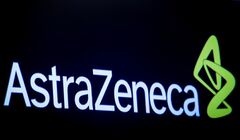AstraZeneca
 | |
| Member of | WEF/Strategic Partners, Wallenberg Sphere |
| Subpage | •AstraZeneca/Chairman |
AstraZeneca plc is a British-Swedish multinational Big Pharma company.
In 2013, AstraZeneca moved its headquarters to Cambridge, United Kingdom, and concentrated its R&D in three sites: Cambridge; Gaithersburg, Maryland, USA (location of MedImmune) for work on biopharmaceuticals; and Mölndal (near Gothenburg) in Sweden, for research on traditional chemical drugs.[1]
History
AstraZeneca was founded in 1999 through the merger of the Swedish Astra AB and the British Zeneca Group (itself formed by the demerger of the pharmaceutical operations of Imperial Chemical Industries in 1993).[2][3] Since the merger AZN has been among the world's largest pharmaceutical companies and has made numerous corporate acquisitions, including Cambridge Antibody Technology (in 2006), MedImmune (in 2007), Spirogen (in 2013) and Definiens (by MedImmune in 2014).
COVID-19
In March 2020, AstraZeneca announced that it would be donating personal protective equipment, including 9 million face masks, to help support various international health organisations mitigating the COVID-19 pandemic.[4]
Cambridge testing
In April, CEO Pascal Soriot reported that the company was working with GlaxoSmithKline and the University of Cambridge to develop a new laboratory capable of conducting 30,000 COVID-19 tests per day.[5]
Oxford vaccine
On 21 May 2020, AZN announced it had received support of more than $1bn from the US Biomedical Advanced Research and Development Authority (BARDA) for the development, production and delivery of a potential vaccine to battle the COVID-19 infection, starting in the fall.[6] AZN said it has the capacity to manufacture 1 billion doses of the University of Oxford’s potential vaccine through 2020 and 2021 and it has already secured the first agreements for at least 400 million doses of the vaccine.[7]
AZN also announced its licence agreement had been finalised with Oxford University for the recombinant adenovirus vaccine. The licensing of the vaccine, formerly ChAdOx1 nCoV-19 and now known as AZD1222, follows the recent global development and distribution agreement with the University’s Jenner Institute and the Oxford Vaccine Group. AstraZeneca has also agreed to support the establishment of a joint research centre at Oxford University for pandemic preparedness research. A Phase I/II clinical trial of AZD1222 began last month to assess safety, immunogenicity and efficacy in over 1,000 healthy volunteers aged 18 to 55 years across several trial centres in southern England. Data from the trial is expected shortly which, if positive, would lead to late-stage trials in a number of countries. AstraZeneca recognises that the vaccine may not work but is committed to progressing the clinical program with speed and scaling up manufacturing at risk.[8]
References
- ↑ "AstraZeneca - About Us"
- ↑ "Global 500 – Pharmaceuticals"
- ↑ "Key facts"
- ↑ "Coronavirus: AstraZeneca donates nine million face masks and steps up Covid-19 drugs research"
- ↑ "UK coronavirus testing capacity boosted by new AstraZeneca, GSK lab"
- ↑ "U.S. secures 300 million doses of potential AstraZeneca COVID-19 vaccine"
- ↑ "Coronavirus: AstraZeneca to supply potential COVID-19 vaccine in September"
- ↑ "AstraZeneca advances response to global COVID-19 challenge as it receives first commitments for Oxford’s potential new vaccine"
Wikipedia is not affiliated with Wikispooks. Original page source here